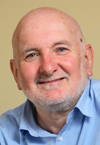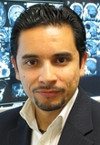Professor James Vickers

BSc (Hons), PhD, DSc
Professor of Pathology, Co-Director, Wicking Dementia Research and Education Centre, University of Tasmania
James has research interests in neurodegenerative conditions, particularly Alzheimer's disease, as well as neural injury and plasticity. In conjunction with Professor Andrew Robinson, James established the Wicking Dementia Research and Education Centre in 2008. He leads the Tasmanian Healthy Brain Project, a large scale prospective trial that examines whether university-level study, as a form of complex mental stimulation, in older adults may provide benefits to cognitive resilience, so as to reduce ageing-related decline in cognitive performance and reduce the risk of dementia.
Professor Andrew Robinson

RN, Dip.App.Sc.(Nurs), B.App.Sc.Adv.Nurs.[ed], MNS, PhD
Professor of Aged Care Nursing, Co-director, Wicking Dementia Research and Education Centre, University of Tasmania
Andrew has established a thriving multi-disciplinary aged care/dementia research program in Tasmania. In 2008 he established the Wicking Dementia Research and Education Centre with Co-Director Professor James Vickers. Since its inception the Centre has made significant progress in establishing an innovative translational research program, with a national and international reach. Andrew has also established a large translational health services research program based in residential aged care facilities, including the Wicking Teaching Aged Care Facilities Program.
Dr Maree Farrow

BAppSc, PhD
Lecturer, Wicking Dementia Research and Education Centre, University of Tasmania
Visiting Fellow, Centre for Research on Ageing, Health and Wellbeing, Australian National University
Maree is a cognitive neuroscientist with expertise in brain development and ageing and neurological and cognitive disorders. Her current research interests include dementia risk reduction, timely diagnosis and early intervention for cognitive impairment, and translating evidence into programs for the community and primary care. Working with Alzheimer's Australia, Maree developed and evaluated a range of resources and eHealth tools for community education about dementia and risk reduction, including the world's first publicly funded dementia risk reduction campaign, Your Brain Matters, and a smartphone application, BrainyApp, which has been downloaded more than 300,000 times and won a 2012 Victorian Public Healthcare Award for healthcare innovation. Maree is currently also teaching in the Bachelor of Dementia Care at the University of Tasmania.
Dr Shannon Klekociuk

BPsych (Hons), PhD
Lecturer, Wicking Dementia Research and Education Centre, University of Tasmania
Shannon is a research psychologist with a keen interest in the neuropsychological profile of dementia. Her research focusses on how cognitive function changes in older age, and how future decline can be predicted in individuals at risk of developing dementia. Other interests include health behaviours related to reducing dementia risk, how individuals understand dementia as a condition, and how society treats those with dementia. Shannon is also a team member of The Tasmanian Healthy Brain Project, a novel study examining the potential benefits of tertiary education in later life. She combines her research with teaching in the Bachelor of Dementia Care, an online degree through the Wicking Dementia Research and Education Centre.
Dr David Ward

BPsych (Hons), PhD
Lecturer, Wicking Dementia Research and Education Centre, University of Tasmania
David undertook his doctoral research with the School of Medicine at the University of Tasmania, investigating environmental and genetic factors associated with healthy cognitive function in older age. His key research interests lie within age-related disorders and neurodegenerative processes that cause cognitive decline. His research examines the notion of cognitive reserve, which provides one explanation for why participation in activities that involve complex cognitive stimulation results in a reduced risk for dementia. Specifically, David is interested in genetic factors associated with synaptic plasticity, which may influence an individual's capacity to benefit from activities said to increase cognitive resilience to pathological processes. He is currently teaching in the Bachelor of Dementia Care at the University of Tasmania.
Professor Kaarin J Anstey

BA (Hons), PhD
Professor of Psychology and Population Health, Director, Centre for Research on Ageing, Health and Wellbeing, Australian National University
Director, Dementia Collaborative Research Centre - Early Diagnosis and Prevention
Kaarin has expertise in epidemiology, public health, ageing, cognitive sciences and neuroscience. Her research interests focus on the prevention of dementia, and the impact of cognitive impairment on activities such as driving. She led the first online dementia risk reduction intervention called Body Brain Life that is soon to be trialled in Primary Care. Kaarin is Chief Investigator of the NHMRC Centre of Research Excellence in Cognitive Health: Evidence, intervention and population modelling. She is a Director of the Alzheimer's Australia Dementia Research Foundation and a member of the Global Council on Brain Health, an initiative of the US AARP and UK HelpAge organisations.
Professor Michael Valenzuela

PhD
Leader, Regenerative Neuroscience Group, NHMRC Clinical Career Development Fellow, Brain and Mind Centre, University of Sydney
Michael trained in psychology, medicine and neuroscience and for his PhD work was awarded the Australian Museum's Eureka Prize for Medical Research. In 2010, he received a NHMRC Excellence Award as the top-ranked Career Development Fellow and in 2012 moved to the University of Sydney to establish the Regenerative Neuroscience Group at the Brain and Mind Centre. Michael's research focuses on lifestyle-based interventions to help prevent dementia and his team is developing an all-new stem cell therapy. He is the author of the popular science title 'Maintain Your Brain' and was part of the Alzheimer's Australia team that developed BrainyApp, the world's first smartphone app designed to help users maximise their long term brain health.
Professor Nicola Lautenschlager

MD, FRANZP
Professor of Old Age Psychiatry, University of Melbourne
Nicola is an academic old age psychiatrist who received her undergraduate and postgraduate training at the Technical University in Munich, Germany. From 2000 she worked at the University of Western Australia. In 2008 she took up the position of University of Melbourne Professor of Old Age Psychiatry. Nicola is the Head of the Academic Unit for Psychiatry of Old Age in the Department of Psychiatry. She is also the Director of Research in the Aged Persons Mental Health Program, North Western Mental Health, Melbourne Health. Her current research aims to contribute new knowledge on how to best support cognitive and mental health in older age. She led the first publication to show evidence in a randomised controlled trial that physical activity can have a significant positive impact on the cognition of older adults at risk for cognitive decline.
Professor Velandai Srikanth

MBBS, FRCAP, PhD
Professor of Medicine, Head, Stroke and Ageing Research Group, Monash University
Srikanth is a specialist geriatrician with clinical expertise in stroke and cognitive disorders. He completed his PhD in the study of post-stroke dementia at the National Stroke Research Institute, University of Melbourne in 2003. Presently he conducts research into stroke, subclinical cerebrovascular disease and diabetes-related dementia. He is the director of the multidisciplinary Stroke and Ageing Research Group (STAR) at Monash Health. An important focus of his current work is to unravel the relationship between metabolic health (diabetes, insulin resistance, glycation) and neurodegeneration.
Associate Professor Benjamin Schüz

Dipl.-Psych., PhD
Associate Professor in Psychology, School of Medicine, University of Tasmania
Ben received his PhD from Freie Universität Berlin before working at Jacobs University Bremen and the German Centre of Gerontology, a federally funded research institute on ageing. He joined the Division of Psychology at the University of Tasmania in 2011. Ben's research is in Health Psychology. Here, he is mainly interested in finding out more about the psychosocial factors responsible for taking up and maintaining health behaviours (or not!). Ben's research has implications for health promotion and for our understanding of health-related behaviours over the lifespan. His current research projects examine the role of self-affirmation on risk perception, how older adults cope with multiple illnesses, and the effects of environmental factors on health behaviour. Ben's research looks at how our social and built environment influences our eating behaviour, how people respond to health warnings, and which role the socioeconomic environment plays in explaining how we think about our health and what we do about it.
Professor Carol Brayne

MSc, MD, FRCP, FFPH, FMedSci
Professor of Public Health Medicine, Director, Cambridge Institute of Public Health, University of Cambridge
Carol is a medically qualified epidemiologist and public health academic whose research focusses on public health, ageing and the brain. Since the mid-eighties her main research area has been longitudinal studies of older people following changes over time in cognition, dementia natural history and associated features with a public health perspective. She is lead principal investigator in the group of Cognitive Function and Ageing Studies (large UK-based longitudinal multicentre studies looking at health and cognitive function in older people) which have informed and will continue to inform national policy and scientific understanding of dementia in whole populations. These studies have recently shown that the age-related prevalence of dementia may be declining.
Associate Professor Mathew Summers

BBehavSc (Hons), MPsych, PhD
Associate Professor in Neuropsychology and Mental Health, University of the Sunshine Coast
Mathew is an AHPRA registered and endorsed Clinical Neuropsychologist and member of the APS College of Clinical Neuropsychologists, conducting research into neuropsychological markers of risk for developing Alzheimer's dementia in adults with mild cognitive impairment as well as the potential for late life education to prevent the onset of dementia or reduce the incidence of age-related cognitive decline. He is the principal Australian investigator on the European Commission funded My Active and Healthy Ageing project, developing in home interventions to reduce frailty in ageing. He is also engaged on the NHMRC funded Tasmanian Healthy Brain Project, a world-first longitudinal study of the potential benefit of University education in older adults to reduce the incident risk of dementia and mild cognitive impairment, in conjunction with colleagues from the Wicking Dementia Research and Education Centre at the University of Tasmania.
